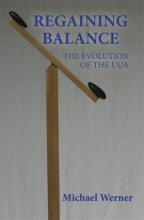Posted on September 4, 2014 by Maria Greene
[Editor's note: Mike Werner, author of Regaining Balance: The Evolution of the UUA, recently taught a class for SecularActivism.org called "Humanism and Unitarianism". Here are his "final words" to the class as it wrapped up. What are your thoughts?]
What can we learn from the Unitarian Universalist experience that can be applied to building humanist communities of the future?
1) Once you lose your focus; your market brand it is hard to regain it. Trying to be all things to all people does not work. People want their religion narrowly focused and meaningful. Every study puts being with like mind people as the main reason to be in our movement, not to be with people vastly different than them. If Humanist groups defocus their energies in supporting the merely humanistic, rather than the naturalistic humanists, the humanism within it is lost eventually.
2) Postmodernism’s poisonous ideology of radical relativism undermines all of progressive liberalism. We may not have certainty, but science provides us tools to explain, make prediction and control the world. Science is true because it works despite the fact that is gives us knowledge that is fallible, tentative, and probabilistic.
3) Always keep a balance of our highest values and don’t let any of them become secular god. Tolerance, reason, justice, love, compassion are all great values, but never have any of them overwhelm all the others.
4) There is no single model of a humanist community that will work. We need multiple models and even within our communities we more than ever need a “cafeteria” of alternatives. Many of the most successful atheist communities are merely social gatherings, or “Drinking skeptically” as some are known. Most of the atheist youth are not involved with organized groups and seek the blogosphere and social media for their community. How do we capture that?
5) Professional leadership may actually harm a group’s growth. You can tell the inflection point in a religious denominations growth curve when professional leadership comes on board. We don’t understand all the reason for this, but the religious ministerial model may not work in the future. What may work is professional leadership that acts more as a coordinator, educator and manager than a minister.
6) The UUA does community real well and humanism very poorly. It used to do both well. The humanist communities, by and large, do humanism very well and really fall short on skills to build intentional communities. How do we do both?
7) Many young people enter the UUA when their children start asking questions. Parents want a liberal community for their children that nurtures, educates and lets the children know they are not alone in their beliefs. The UUA cannot hold onto children because they don’t provide an evocative grounding. Hodding Carter is famously quoted saying, “There are only two lasting bequests we can hope to give our children. One of these is roots, the other, wings.” We do great on the wings, but the children are left to fly direction-less which is possibly why the UUA has the lowest retention ratio of any denomination at only 12%.
8) Be careful with words. Words have the power to create meanings or destroy them. I think it is more than time to withdraw from the religious redefinition game. Even John Dewey saw his use of religious language as metaphor as an evolutionary technique not a revolutionary one. While many may think the language of reverence is inclusive, that it is not for the vast majority of humanists. Millenials, in particular, have a great distaste for the religious redefinition game. It decidedly favors the theistic point of view.
9) Lastly, Humanism is a blend of both the Enlightenment and the Romantic projects and a full humanism embraces both the heart and the mind, reason and compassion.
I originally asked you why you are here. I think you and I are here because we want a better world. We want a better world, but we believe that secular values, indeed Humanist values will make a better world. This isn’t just about the “right-ness” of our cause, but the practical effects. There is something more though.
Our hearts long for an integrated whole view of life that matches with reality. We long for a vital center to our lives that both grounds us and inspires us, a vision of grander authenticity to our lives and not just smaller truths. All of us long for an evocative whole story and higher vision that lifts our hearts, moves our society, pushes us to higher meanings, and ennobles our lives. Some may find that integrated story is already there in the balanced humanist secular life of here and now, of heart and mind, reason and compassion, accepting the exhilarating challenge of moving toward a responsible search for truth and meaning.
The humanist lifestance is based on our values, not our beliefs, where open-minded critical thinking, science, justice, freedom, tolerance, democracy, compassion, human rights, inherent worth and dignity, and human flourishing hold our web of belief together.
We can’t afford the luxury of just critiquing religion. We must tell our alternate story so that those contemplating change know there is an alternate worldview that can support, inspire, and comfort them; that the knowledge of science, while tentative, is surely firmer than blind faith; that the exhilaration of focusing on the here and now is more meaningful than otherworldliness; that hope and love are certainly better than hate and divisiveness; that compassion and responsibility can be balanced with self-interest and freedom. That ambiguity that is inherent in all our value/ethical/political choices we spoke of earlier need not paralyze us, but it does make it even more important we reflectively consider all our choices.
Humanist ethics derives its power by affirming the inherent worth and dignity of all people and realizes that if justice is to be given only we can give it. If love is to be given only we have the power in this moment and in this hour. By not doing so, the opportunity is lost forever. Suffering not relieved is real suffering, not washed away by the hand of a loving god when we die. This world is all and enough. Enough to fill us with joy and wonder and hope and awe that is our natural birth right.
Now is our time and now is our chance to move society toward reason and the good life. Now is our time to move society out of the dark ages of theocratic and ideological control toward human fulfillment. We cannot falter in the face of certain hostility, our own inherent ambiguity, and we cannot stand idly by hoping for a secular society to automatically shape itself. It is our duty to show that a secular world need not end in nihilism, but we can build communities that embrace a progressive, humanist, ethical worldview of human and global good.







3 Comments
Permalink
The second paragraph, "radial relativism" should read, "radical relativism", I think.
Thank you, Rita, the typo is fixed.
Mr. Werner consistently demonstrates a profound misunderstanding of post modern thought. It would be more helpful if he cited the post modern theorists who he feels are "poisoning" some well. First, there is no post modern text that all who would claim to be a post modern thinker would claim to be "the word." Second, having said that, there is a dominant theme: knowledge, as differentiated from truth or fact, is a social construct. Language, epistemology, history, politics, etc. all define "knowledge" within a specific context. Third, Mr. Werner does not discuss the hand maiden of post modern thought: critical theory and deconstructivism. If knowledge is a social construct, then it is essential that it be examined and tested from multiple perspectives. Power enters the equation and influences knowledge and its use.
Any student of the history and foundations of scientific thought emerges from their studies as a post modernist. Science creates knowledge and, fortunately, often illuminates an understanding of reality that is maintained and found useful over time. But that understanding changes. The changes emerge from concerted effort, through accident, or because some young upstart says to him/her self, "I just don't buy it."
Where Mr. Werner may be on to something, but may have chosen the wrong target, is an absence of deconstructivism and critical theory in the thinking of many UU ministers. I don't know that this is the case, and I doubt that he has any data to support that it is or is not a widespread phenomenon. As the late Senator from New York was fond of saying, Mr. Werner is entitled to his own opinion, but not to his own facts. My hunch, is that there is a fairly widespread reluctance amongst our ministerial core to apply critical challenges to the thinking of some of their congregants. This could be interpreted as a kind of "anything goes" mentality, or it could be good pastoral care. I don't know. My hunch is that there is a tension here that requires artful management.
Finally, I see a close relationship between the aesthetic experience and the religious experience. Can these be subjected to scientific investigation? Absolutely. At MIT there has been an on-going investigation of the brains of Buddhist practitioners and they are different from the brains of non practitioners. In social psychology recent studies have shown that meditators are more compassionate than non meditators. In the world of health outcomes, church goers are healthier than non church goers even when all of the normal culprits are factored out (social support, self selection, etc.)
The bottom line, for me, is that humanists and religionists both need to adopt critical theory and deconstructivism as essential tools. As a working scientist, I see these as essential processes.
Vaughn Keller
Post Modernist